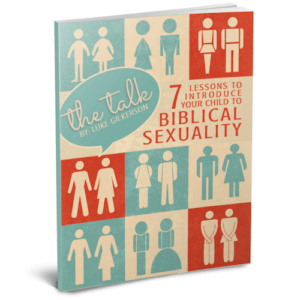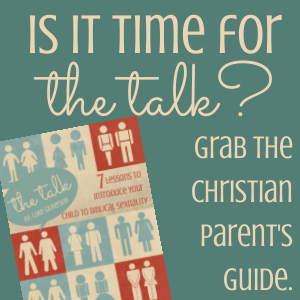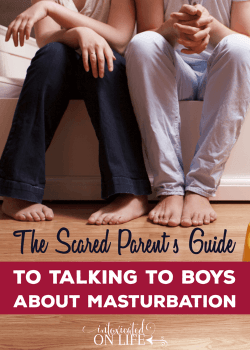Should you talk to your 8-year-old about sexual intercourse? How about your 6 or 7 year old?
I recently wrote a parent-child Bible study called The Talk: 7 Lessons to Introduce Your Child to Biblical Sexuality. The study is geared for children ages 6-10 years old. After about 3,000 people downloaded it the first weekend it was out, amidst the positive remarks I started hearing concerns. They usually sounded something like this:
“These lessons are filled with good information and all, but isn’t 6-10 years old too young? Won’t this make them too curious too soon?”

A Respectful Disclaimer
Every child, of course, is different. What one child can understand at age 6 other children might not be able to grasp until age 9. I have no desire to stand in the place of any parents and claim that I understand what is best for their children.
Dear reader, don’t offend your own conscience just because some blogger who wrote a Bible study said it was okay. Instead, use this as an opportunity to prayerfully challenge your own assumptions.
.
Objection #1: “Teaching kids about sex robs them of their innocence.”
Parents with this objection don’t necessarily equate “innocence” with “sinlessness.” (Christian parents will tell you they are well aware of just how sinful their child can be.) Rather, “innocence” is a shorthand way to talk about childish naivety. We all acknowledge that there are experiences that a child is not prepared to emotionally handle—such as being exposed to graphic pornography or violence. We want to shield our children from the harsher realities of life and let them “just be kids” for a while.
My response:
Information about sex does not rob a child of innocence because sex is wholeheartedly good. The very reason why pornography is so scarring is because it titillates viewers with lies about sex and exposes people to images designed to entice lust. But the Bible is filled with true information about sex and its goodness.
It is true that kids don’t need to be exposed to an adult appetite for sex, but true information about sex can bless a child in profound ways. Think about all that is included in godly sexual education. When infused with biblical values and attitudes, sex education can be a window for a child to see the beauty of God and His creative power. They can see divine purpose in the creation of their bodies. They can develop respect for the opposite gender, who is also created in God’s image. They can learn to marvel at how life begins and develops in the womb. They can begin to appreciate the special bond that married couples share. They can learn to treasure modesty because they treasure the gift of their bodies.
.
Objection #2: “You can’t talk about sex with young children in a way they can understand.”
Many parents simply can’t picture their little child of 7 or 8 years old grasping concepts like sexual intercourse, how babies grow in the womb, or why sex is something special for husbands and wives. These are “adult” ideas that no child can really wrap his or her mind around.
My response:
Here, I partially agree. Of all the reasons to “wait” to talk about specific concepts, this is the one I feel has the most merit. For the same reason I don’t make my 2-year-old start learning his times tables, I don’t necessarily want to have a long, fireside chat with my 5-year-old son about sexual intercourse.
Notice my emphasis here: The problem is not that sexual topics are inappropriate for the very young because sex is a “naughty” topic. Rather, the problem is that the kind of conversations you have with younger children and the type of knowledge you impart to them must be brief, concrete, and fit their cognitive abilities.
I think the age of 6 or 7 is a good time to think about having deeper conversations with children—not just about sex but about all manner of theological topics. I say this because from ancient times to the present, people throughout the world have noted a developmental shift that takes place around this age.
- Around the age of six or seven, a child’s intellectual capacities begin to change, allowing you to have more detailed discussions with them about a variety of topics. (Jean Piaget called this the “Concrete Operational” stage of development.) At this stage, a child can begin to distinguish between their own thoughts and the thoughts of others. They can think more logically about objects and events.
- Behavioral scientists notice that from six to ten years old, peer relationships become more valuable to children than before. Around the age of six (give or take a year), children also tend to form stronger same-sex friendships and they show a strong interest in gender roles.
- It is not uncommon in this stage for children to begin mimicking the intimate behaviors of others (pretending to be married or boyfriend/girlfriend, kissing, holding hands, etc.).
In brief, yes, some 6-year-olds may not be “ready” to have sit down conversations about the birds and the bees, but this is not because sex is scandalous, but because sex is complex. Give it a year and see how their intellect progresses.
.
Objection #3: “We should wait to teach kids about sex until puberty.”
For some, its seems that the best time to talk about sex is when kids are going through the hormonal changes of adolescence. This is when they need to know about the purpose of sex and how to avoid sexual temptations. Any information before this will be lost on them.
My response:
It was assumed for many years that sexual attraction was linked to the maturing of a child’s body to be capable of procreation (when the testes or ovaries are mature). Now researchers know that our sex organs are not the sole cause of sexual attraction, but it also involves the maturation of the adrenal glands during middle childhood.
Between the ages of 6 and 8, the adrenal glands begin to mature. During this stage, dehydroepiandrosterone (DHEA) is secreted by the adrenal cortex. The metabolizing of DHEA leads to both testosterone and estradiol—the primary sexual steroids in men and women. At age 10, DHEA levels increase significantly—about 10 times the amount a child has at age 4.
Several independent studies confirm that 10 years old is also the average age of first sexual attraction for both boys and girls, though sexual “fantasy” does not necessarily begin until later.
This is one reason why I think that if you’ve done no sex education by age 10, it is best not to delay. By this age, children have been experiencing 2-4 years of sexual steroids in their system and have probably started to develop an immature sense of attraction. (Any parent that has ever caught their elementary-age son leering at the cover of Cosmo in the grocery store will resonate with this.)
.
Objection #4: “Kids don’t have sex, so there’s no point in talking about it until they are ready.”
Kids should only be taught about things they are ready to apply, parents think. Since my son or daughter isn’t ready for sex, there’s no point in burdening them with too much information. Why bother with it?
My response:
While children generally don’t seek out sex at a young age, children can be abused at a young age. Children are actually most vulnerable to child sexual abuse between the ages of 7 and 13. Of all victims of sexual assault reported to the police, 34% are under the age of 12. Most victims of sexual abuse are related to the offender.
At the very least, sex education during that age of 6 and 7 should include information about sexual abuse and the need for a child talk to trusted parents if something happens. Yes, chances are good that your child will be fine, but do you really want to bank on “chances are good”? Countless parents of victims said to themselves, “That would never happen to my child.” For the sake of their own safety, educate them.
.
Objection #5: “Sex ed could make them sexually curious too early.”
By far, the biggest objection to talking about sex in the elementary-school years is the fear that children are not able to handle such information. If exposed too soon, children will become sexually curious or even experimental. It may give them ideas.
My response:
The majority of children in western society are exposed to ungodly sexual education at an early age already. Media is rife with sex. Magazine covers ooze it. And public schools are breeding grounds for false information about sex to spread among a child’s peers. Many six-year-olds are coming home from school talking about boyfriends and oral sex. Don’t even get me started on the Internet.
As Christians, we must understand that there is a great value in being first. If lies about sex are bombarding our children, we should do all we can to lay a firm foundation of truth in them. If the world is screaming at our kids, it is unwise for us to be silent.
And if you are concerned that your conversations about godly sexuality will give your child bad ideas, just think of what wrong ideas about sex will do to them. Don’t wait and let the world fill the void.
.
Objection #6: “We homeschool our kids so they don’t have to be exposed to this stuff.”
“Alright,” you say, “if you’re among the unfortunate parents who have to send your kids into the lion’s den of public education, I guess you should probably have talks about sex earlier, but one of the reasons we keep our kids at home is so they don’t have to hear about sexual perversity.”
My response:
Even the most sheltered kids can be exposed to wrong sexual information. I know many homeschoolers who were taught about sex through friends at church or in homeschool co-ops or talking over the fence with a neighborhood kid.
Plus, as Christian homeschoolers, we may already be unwittingly giving our kids information about sex. When my son turned 6, I bought him a thick book full of information about sex. It includes stories of homosexuality, rape, incest, nudity, prostitution, seduction, and adultery. It also talks about intimacy, love, and sexual passion.
The book is called the Bible.
I’ve spoken with many homeschooling moms and dads who have watched their children become curious about sex by simply reading the Word of God.
In addition, there are dozens of real-world situations—none of which are sinful—that can spark a child’s interest in sexual topics. I know a lot of homesteaders who talked with their kids about sex at a very young age because their children were always catching animals “in the act.” I send my kids to a weekly homeschool co-op where their science curriculum—developed by a conservative, well-known publisher—talks about the mating rituals of walruses and dolphins. Any number of pregnant women that children might see in their church or in their own extended family can spark curiosity. It doesn’t take much to get them asking questions.
We can shelter our kids (to some degree) from what this sinful world shows them—and we should—but we cannot shelter them from reality. The reality is that we live in a world designed by God as a sexual world. (And remember, sex is good.)
.
Objection #7: “My kids haven’t asked me any questions yet, so I’m not eager to tell them.”
For many parents, they are waiting for specific cues from their children. “Where do babies come from?” “How does the baby come out of you?” “Why does my penis get big?” Once these questions start coming, then they gear up for serious conversations.
My response:
By all means, if you child is curious about something, talk to them. Answer his or her questions. Even if your child is only 4 years old, give him or her an brief answer he or she can understand.
But don’t wait for the perfect moment of curiosity or “just the right question” to talk to them. We teach our children all sorts of lessons and ideas every day that aren’t sparked by their initial curiosity. From school subjects to everyday habits, we set priorities for our kids. And when it comes to godly education, we don’t hold back and wait for them to ask specifics about God. We don’t wait for our children to ask us “how can I be saved” before we give them the gospel. We start before they can talk.
Waiting for signs of curiosity might be fine at first, but many kids never vocalize their curiosities. So, take the initiative.
.
Objection #8: “My friends brought it up with their kids and the kids were really embarrassed by it.”
“This all sounds good in theory,” some say. “But I know parents who started having this talk with their kids and it was really awkward. The kid was uncomfortable. The parent was uncomfortable. Now, that kid may never come and talk to his parents about sexual stuff because it was such an awkward moment.”
My response:
No doubt, there are some sexual conversations that will feel awkward. Some kids will act more embarrassed than others. But I propose a few factors often lead to more awkwardness:
- The parents’ attitudes communicate discomfort – If a parent still feels that sex is a weird or icky topic, this attitude could be communicated in body language, tone of voice, or even the way the topic is approached. Kids pick up on this and will mirror the same attitude.
- Parents wait until after the child has picked up ambiguous sexual ideas – If the child has already picked up conflicting ideas from home, church, the world, and media, they may have developed a sense that sex is this odd, exciting, yet forbidden topic. Then when mom or dad comes to have a “serious talk” with them, what child wouldn’t find it a little weird. In this case, you may not be talking to your kids too early, but too late!
- Parents fail to make rudimentary conversations about sex comfortable – Generally speaking, when parents think of “the big talk,” they are thinking of the conversation where they tell their child about what sexual intercourse is, why it is special for married couples, and how it can produce new life. But there are thousands of little conversations that take place before this that can make “the big talk” something that feels natural. Parents can call body parts by their proper names from infancy. Parents can help a child understand his or her own body. Parents can speak matter-of-factly about things like love, marriage, pregnancy, and other related topics. Kids are bound to feel weird about sex when the parent’s attitude is constantly: “Thanks for asking me, but that’s not an appropriate topic to talk about.”
Some parents treat sexual conversations and anything that revolves around them like something that must be locked away in a safe until Mommy or Daddy pulls it off the shelf for special moments. The kids watch as the parent carefully unlocks the safe (like it might explode on her), takes out the contents, talks about them, puts them back in the safe, and puts the safe back on the shelf. Kids have just been told: the stuff in the safe is like plutonium: not to be brought out unless absolutely necessary.
.
Objection #9: “Talking to my kids about sex is intimidating. I don’t know really what to say or how to say it.”
For some parents, they don’t object to teaching young kids about sex as much as they object to doing in unprepared. They don’t know where to start, what to say, or how to say it. They know these conversations are important and don’t want to just “wing” them.
My response:

I wrote a 7-lesson Bible study for parents to use with their children. It’s simple series of lessons, all based in the Scriptures, mixed with a little biology.
Here’s what my friend Jennie Bishop has to say about it…
“The most effective way to protect our children from the lies of our over-sexualized culture is by raising our kids to know the truth from their youngest years…Luke’s simple, truthful, gentle booklet is the primer for doing just that. Get it, give it, and help restore this pornified world…one fully-equipped life at a time.“ – Jennie Bishop, Founder of PurityWorks and author of The Princess and the Kiss
Check out the Bible study for your family.
If you are looking for additional resources on godly sex education, here are some of my favorite resources by others:
- Teaching the Birds and the Bees Without the Butterflies, by Tracy Lester – This is an excellent primer for Christians who feel intimidated by sexual conversations, giving you simple scripts to follow.
- Straight Talk with Your Kids About Sex, by Josh and Dottie McDowell – This book is filled with practical tips and well-researched information for parents.
- Planned Purity for Parents, by Jennie Bishop – Jennie’s book offers parents a holistic approach to teaching purity from a very young age, offering scripts and practical advice to parents about hard questions.













Outstanding. Very well done! Thank you for addressing this! Can’t wait to share it!
This is fabulous information. I am so glad to be reading it while my children are at a good age to begin teaching them (7 ½ and 5 ½).
Thanks! Glad you enjoyed this!
I am sooo glad I found this sight on Pinterest! Thank you we have a 7 and 9 year old and we were having a hard time knowing how to just… start the conversation.
Starting is perhaps the biggest step to take. It can be hard to get over the hump of awkwardness.
In my Bible study, I use the format of family devotions because many families are in the habit of opening the Bible with their kids. For many families, this is the most natural context to talk about matters of faith. I just use the Bible to break the ice. I’ve heard from a number of families that this approach has worked really well for them. At the same time, if you aren’t accustomed to family devotions, this study probably isn’t a good one to start that tradition.
This makes so much sense. Thank you, thank you for a refreshing, practical and most importantly Biblical approach to sexual education.
Thanks, Kelly! It is encouraging to read your comment!
Thanks for writing this. We have only been blessed with one child — a boy who will be 12 this summer. For some reason (it wasn’t because I was influenced to do so), I realized that I just needed to be open to talking about everything with him at a young age. I would never have decided to talk to him about sex and things of that nature, but he was so inquisitive! About everything in life, I mean, so, well, babies and how they get into mommies “tummies” and how they get out and body parts, too. I’m so thankful NOW that he asked questions, and that I had determined not to put him off. I always tried to answer as truthfully and appropriately as I could for his age at the time. As we homeschool, I finally decided to just teach him “sex ed” while we were studying the human body when he was in 3rd grade. Most of my friends look at me askance when I tell them this, but I am glad that I did. We have a very open communication now,and he comes to his father and me with questions and concerns all the time. I pray this does continue the older he gets! Because of how I was brought up, I never would have thought to talk to a child so young if he hadn’t started questioning. Now, I completely agree that this is a good thing to do whether your child asks questions or not.
I really enjoyed your honest approach to sex education and I really appreciated all the excellent book references. Nicely done.
Thanks, Mary. It is encouraging to get your feedback!
For those who are uncomfortable talking about sex, your body language will communicate that. To avoid sending mixed signals you can sit next to your child (not across from them.) Or go for a walk to start the conversation. It’s far less embarrassing for you and the child, makes it more casual and easier.
I loves this post!
Thanks, Sara. Nice thoughts. Body language is very important in all of this.
Brilliant observation about the Bible being rife with sexual immorality. I have 5 and 7 year old boys. You really got me thinking.
Yeah, we have to remember that the Bible is not G-rated book, and that’s okay. The Bible presents sexual immorality in the right light without shielding readers from the harsher realities of sin.
Of all the things we as parents should not shy away from is sex. We teach them about everything else, but why leave this out? I’m so glad you have provided a resource for those of us who don’t know where to start. I grew up in a home where it was not talked about and I was not prepared for marriage and I don’t want that for my kids. I want them to be healthy, safe, and follow God’s guidelines in a positive way. This is an important topic that needs to be addressed and I agree with you, Luke! Thank you so much for being bold and brave!
Thanks! I agree. No sense in not preparing them.
I would much rather teach my girls about sex than have them learn it from elsewhere. I learned more about sex from my sister’s cosmos than from school or my parent, who’s talk was “don’t get pregnant” when I was 15. I love what I have with my husband but I made some mistakes before I met him and I want my girls to have more knowledge and understanding than I did, so hopefully they make better choices than I did.
Exactly. It is so important, as parents, we be the primary educators of our kids in this area.
Do you have any suggestions for addressing the issue of children in the house of very different ages? I’ve bumped up against some awkward moments when one of my children has asked a question that I’d have no problem with answering – except it was asked in front of a MUCH younger sibling who wasn’t ready for the answer yet.
Also…I don’t know if you address this in your study or not, but I told my daughter that this is something not to talk about with friends *because their parents want to be the ones to share it with them*, just like not spilling the beans about Santa Claus or the Easter Bunny. (I’m not sure that would necessarily work with a 6yo, if he still believes in Santa Claus, but for us it was a good analogy to help her understand it’s not a bad thing, but not to spoil that opportunity for them.)
It will depend somewhat on the situation. Sometimes you can speak to older children in a way that speaks over the heads of younger kids (especially if you’ve had prior discussions with the older kids). We’ve been able to have more candid conversations with our oldest now that he knows a lot of the basics, even with the younger kids around.
At times, that may not be possible. Give your oldest a brief but satisfactory response and then say, “There’s actually a little more to it than just that, so I’d love to talk to later about it when we have some time alone.”
We do cover the issue of not discussing these things with other kids in the book. On the very first lesson I write, “This is all very interesting information, but it is important that parents share this with their children. You shouldn’t talk about any of this with your friends, because that’s their parents’ job, not yours. Don’t bring this up around them, and if any anyone brings it up to you, just tell them that it isn’t an appropriate conversation. ”
Thank you, Luke!
This, my friend, is outstanding.
I have been pondering this very thing for quite some time. My parents never actually sat down and had “the talk” with me. In fact, my younger brother gave me more details than my mother or father ever did! I always felt like this damaged my view of sex far more than it would have had they spoken to me about it at an early age. It has definitely changed my views on how I will approach talking about sex with my future children. Again, I applaud you for being so honest with such a hard topic.
Thanks, Haley. It is very encouraging to read your comment!
Sharing this with friends! I have many friends asking God how I ‘had the talk’ with my son (now 11) and I felt that I waited to late (he was 10!). I kept hoping for him to be curious. I answered all questions with truthful info, but he never kept asking.
I have the God’s Design for Sex series. One day while reading the Bible – specifically Rueben having relations with his dad’s concubine – my kiddo asked “Wait, he married his dad’s wife?” This was the opening we needed. I canceled the rest of our school day and we read in the books and got mostly caught up! It felt freeing to know he KNEW and now we have other smaller conversations when they come up.
That’s awesome. This is, I feel, one of the best ways to break the ice on sexual topics: just read the Bible and don’t censor the obvious questions that arise. This is similar to how my oldest son started to have his curiosity piqued. He was reading Genesis and was so struck by a world where two people would walk around naked all the time. That got him thinking about questions of gender and modesty and marriage.
I appreciated the thoughtfulness of this post.
I have always found it interesting why parents fret over this so much, especially Christians.
I never had a “birds and bees” conversation with my parents – I didn’t need it. My mother gave birth to two more children after me, I was aware of her sharing a bed with dad, her growing belly, baby’s arrival – all without details needed. My mother also spent time reading and studying the Bible with me – go through one summer learning about the women of the Bible and you quickly understand – to “know” within marriage is GOOD, to “know” outside of marriage is always BAD.
We have five daughters, ages 17, 15, 11, 6, and 4. They have asked a variety of questions over the years. We always took the point of view that they didn’t need to know more than they could freely discuss with others and still be modest. The age for that differs with the girls – but it was never earlier than age 9. But we are ALWAYS talking about how amazing the human body is, God’s creation works best when it follows His will, we do Bible studies, they have science classes. They are not limited in exposure – they are limited in focus. We just do not make it a big deal.
God understood that mankind would know what “and Adam knew His wife Eve” meant. He didn’t need to explain it. We don’t either – as a sit down making it a bigger deal than it needs to be type thing. Some things are private, some things are meant to be understood later, some things are better given a context when your body can understand the context. Discretion is an art that is taught by how we handle the topic in the first place.
Again – I appreciate the post. Very good thoughts for those who struggle with what to say and when. Thank you for sharing it.